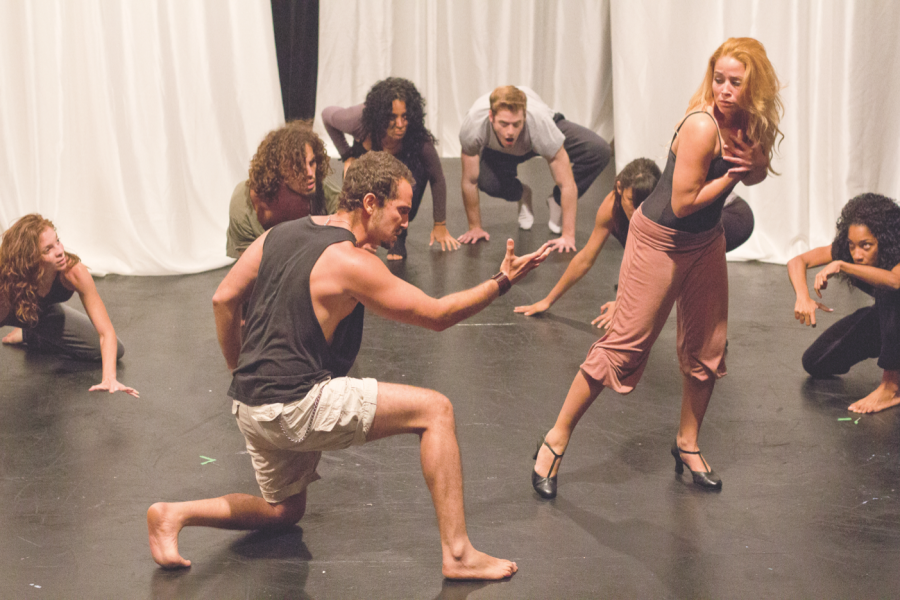University of Alabama students will be taking the stage in Tuscaloosa, New York City and Havana, Cuba, this summer with their production of “Alcestis Ascending.”
The play, an adaptation of Euripides’ “Alcestis,” is written and directed by Seth Panitch as part of creative research in the Alabama-Cuba initiative. The production includes UA students and Cuban actors and actresses, and is performed in both English and Spanish.
William Ruiz, assistant director for “Alcestis Ascending,” said including the English and Spanish languages in the play brings both cultures to the stage, allowing one to learn about the other.
“It’s not only the language, it’s also the culture,” Ruiz said. “It’s a different culture. A different way of working in the theater and a different way of living. And I think that that’s very interesting for an audience and for actors in the performance. It makes you grow by watching the way that the other ones work, then you add that to your own.”
He said the duality of cultures on the stage also creates a community for the audience, by transforming the play into a form of communication beyond words.
“For an audience, theater is about creating community,” Ruiz said. “Creating a space where people are together, sharing something. And if you have a play where you have people that some of them don’t speak the same language, but they are able to communicate through a different language, the language of theater and working together – that’s a different level of communication and being together.”
The play itself is about self-discovery through the appreciation of one another. “Alcestis Ascending” follows the story of King Admetus who, with his thread run out on the wheel of Fate, must either die or find a replacement for his journey down the river Styx. After a series of denials by friends and family, his wife Alcestis selflessly takes his place in his moment of death.
Finding himself in his darkest place yet after his wife’s passing, King Admetus realizes his previous narcissism and sets out to recover his wife with the help of his friend Hercules. He must battle both Hades and his own destructive vanity.
“The story itself always interested me,” Panitch said. “This aspect of the Hercules myth and that this guy would have to find someone to replace him, and ultimately the lesson is, you don’t. You take responsibility for yourself. Nobody deserves to die for you; you take responsibility for your own life. When your own time is up, you go.”
He said it was not Euripides’ ending though that caught him, but instead the scene where the king must face a new reality.
“The moment after he lets his wife die for him, how does he feel? What does he go through?” Panitch said. “How on earth could someone ever redeem themselves from making a choice that is that awful? That’s why I wanted to write this play.”
Panitch has taken the traditional Greek myth and made it his own, with the inclusion of multiple languages, dancers and even rock music. He said the elements come together to tell the audience the story in a distinctive way.
“Hopefully it creates an alternate world with laws that the audience can track and follow so they’ll accept the nontraditional expressionistic moments near the end because of what we’ve set up early on,” Panitch said. “You’ve got to make sure it’s organic, that it comes from the story, and that you’re finding every opportunity to tell the story in between movement and acting.”
Ruiz said in the end, they are looking to create one idea from the blending of many languages.
“The idea is that it’s a very multidimensional play,” Ruiz said. “You have people from different cultures, different countries, different languages, and you have dancing, and you have the acting, the great myth, and then you have rock music. In the end, it’s about how all that makes a single image. And that’s what we’re looking for – a mixture of all those.”
“Alcestis Ascending” will run July 1 through 5 at the Allen Bales Theatre on the UA campus, July 9 through 21 at Harold Clurman Theatre at Theatre Row in New York City and July 24 through August 4 at the Raquel Revuelta Theatre in Havana, Cuba. For tickets for the New York production, visit alcestisascending.com, or contact Panitch at spanitch@ua.edu or (205) 348-3845.









